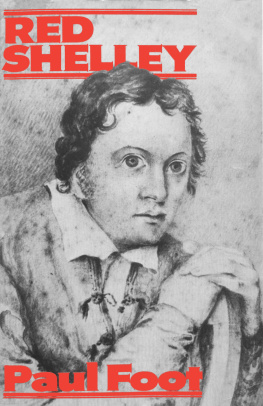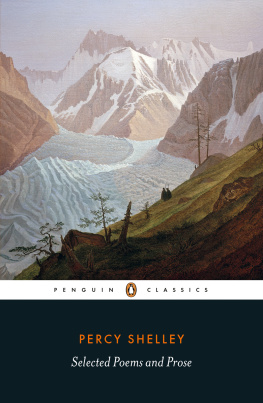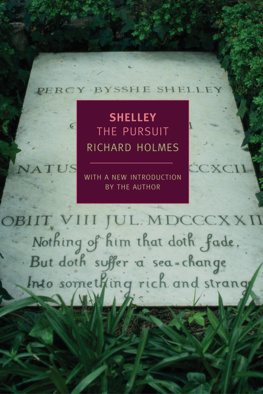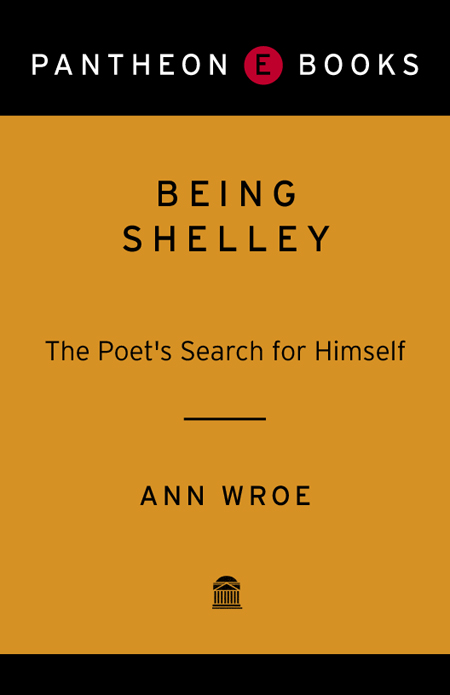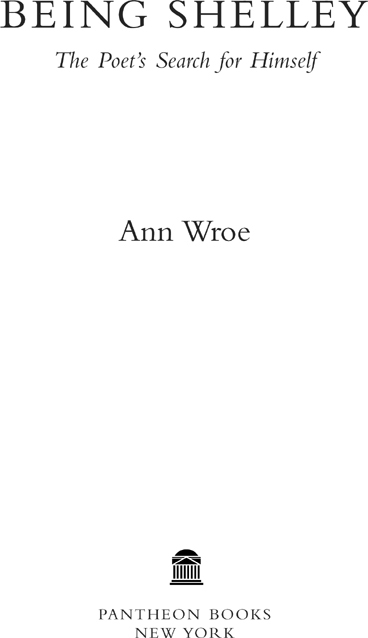p. ii P.B. Shelley drawn from life by E. E. Williams, Pisa, 29 November 1821. In the private collection of the Plimpton family, New York. (Reproduced from Jones, Gisborne Letters (1951), p. 30)
p. 1 Man and rocks (1821): from Bodleian Shelley Manuscripts (hereafter BSM) e. 9 p. 378
p. 3 Pile of stones (1817): from BSM e. 10 p. 170
p. 35 Grave and flowers (181617): from BSM c. 4 f. 68v
p. 75 Faces and figures (1821): from BSM c. 4 f. 292v
p. 105 River, wave and boat (1819): from BSM e. 3 endpaper
p. 107 Intelligences (1815): from the back cover of Shelley's annotated Queen Mab. Reproduced by permission of the Carl F. Pforzheimer Collection of Shelley and his Circle, The NewYork Public Library, Astor, Lennox and Tilden Foundations.
p. 137 Eyes, lake and island (1817?18): from BSM e. 4 f 85v
p. 167 Sailing boats (1821): from BSM e. 18 p. 106
p. 197 Tree sketches (1817): from BSM e. 19 p. 22
p. 199 Daemon chasing woman (1821): from BSM e. 9 endpaper
p. 229 First draft of To a Skylark (1820): from BSM e. 6 p. 97
p. 255 The Spring rebels not (1821?2): from BSM e. 18 front pastedown
p. 291 Volcanoes erupting (1821): from BSM e. 9 p. 336
p. 293 Temple and lion (1817): from BSM c 4 f. 2v
p. 315 The Devil: Shelley's sketch of February 1813 copied by Miss Fanny Holland and published in the Century Magazine, October 1905. (Reproduced from Newman White's Shelley (1948), vol. 1, p. 283)
p. 341 Comet and Thou wert the Morning Star'(1821): from BSM e. 9 p. 317
p. 383 The boat appearing (1822): from BSM vol. 1,Triumph of Life, f. 53v
All Bodleian material is reproduced with permission. For guide to abbreviations please see Notes on page 393.
Introduction
T his book is an experiment. It is an attempt to write the life of a poet from the inside out: that is, from the perspective of the creative spirit struggling to discover its true nature. It is a book about Shelley the poet, rather than Shelley the man. The distinction was one he himself was sure of. The poet & the man, he wrote in 1821, are two different natures; though they exist together they may be unconscious of each other, & incapable of deciding on each other's powers & effects by any reflex act.
The man who was Shelley is not neglected. He was the dragging shadow with which the soul had to live. But the usual priorities of biography are reversed. Rather than writing the life of a man into which poetry erupts occasionally, my hope is to reconstruct the world of a poet into which earthly life keeps intruding. This, I believe, is how things were for Shelley. The lives of great writers and thinkers are not principally a succession of ordinary events in the day-to-day world. They live, and often move, elsewhere.
Sheer astonishment at Shelley's poems made me write this book; astonishment, and regret that his spiritual force seems to have been largely forgotten. In the twentieth century his biography was rewritten to recover, rightly, his political radicalism. As a result he has been brought severely to earth, as if this is the only way to make him strong, sharp and relevant to us. But if the life of the spirit is man's most vital resource and means of change - as Shelley believed it is - he has truly revolutionary things to suggest to us. To dwell on his metaphysics does not blunt his challenge or still his urgency at all.
My sources have been almost entirely Shelley's own words: in poetry, prose, letters, recorded conversations, and especially his notebooks, preserved in the Bodleian Library at Oxford and the Huntingdon Library in San Marino, California. Of the mountain of literary criticism on Shelley I have read what seems best. But his is the only mind whose labyrinths I want to explore - through his confident, flowing essays, his scratched-out, stumbling efforts to describe his visions, and also in his pauses.
This book does not proceed chronologically. It takes seriously Shelley's statement that a poet participates in the eternal, the infinite and the one; as far as relates to his conceptions, time and place and number are not. Its narrative track is the poet's quest for truth through the steadily rarefying elements of earth, water, air and fire. It is an adventure story of Shelley's search to discover, in his words,whence I came, and where I am, and why.
These questions enthralled and obsessed him. Everything Shelley proposed and pursued had its basis in his search for the meaning of life and the truth of his being. His friends and lovers - Byron, Mary, Leigh Hunt - complained about his devotion to mystifying metaphysics and wished he could be weaned away from it, but Shelley's emphasis made perfect sense. No revolution in the moral and social order could take place until he, and all men and women, knew themselves for what they were and could unlock the true power they possessed.
Some readers may complain, as Shelley's friends did when they read his works, that this book is not about real life. I would disagree. And, more to the point, so would he.
Prelude: The voyage out
I n the morning he set sail. The high sun beat on the water, and the wind was soft. A push from the shore set him rocking across the shallows, above his own shadow on the rippled sand. The keel dipped, and the ink on it began to blur and run. But it did not yet ship water, and he was safe.
The whole craft juddered, from stem to stern, as it breasted the continuous waves that formed and swelled before him. His ballast, a halfpenny piece, held him steady; beneath it lay the hull, porous and slowly softening, inscribed with the words Your most Obt. Servant. He was not most obedient, but bold and exploring. He bucked and circled, skimming the surface of the dim tremendous deep.
Wind filled every part of him, though invisibly. The pinched white peaks of his sails were swollen and crinkled with the pressing air. At the stern the wind was a rough god, buffeting him. The whole world was motion and breath; stirring his hair, playing over his skin, blowing in every nerve and vein of him, a shell of woven paper intrepidly and madly on the sea.
Time could not touch him. On land perhaps an hour passed, as impatient friends waited for the game to end. On the water he essayed a full Odyssey, or a voyage of the Argonauts that might stretch out for years. He passed Charybdis and the isle of the Sirens, dipping dangerously close. Sea monsters rose with the plop of a trout, and the wide concentric ripples rocked and disoriented him. Glittering wavelets almost swallowed him in the dazzle of the sunlight they reflected. At all times the contest went on between his desire and the wind's control, at variance or at one, as long as his substance lasted.
To the casual eye he was on shore, a tall, stooped young man with tangled hair and yet more boats in his pockets. He was, as his friend Hogg once said, the Demiurgus of Plato's Timaeus, constantly creating both men and the lower gods, equipping them with star-souls and setting them afloat. The remark made him laugh like the giant he seemed to be, filling the horizon of his little fleet with cataclysmic splashings. Yet in reality he was out on the huge sea adventuring, one of them.
The end was still unknown. After years the tiny boat might reach the other side, all obstacles triumphantly circumnavigated, to be swept up joyfully in the Demiurgus's arms and crammed inside his jacket. Or the wind would take him, twirl him and overset him. Water would soak his body, and with a rapturous rush of cold he would go down into the unimagined depths.







